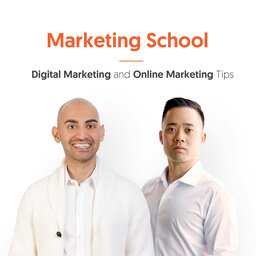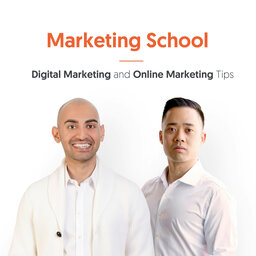The LinkedIn Algorithm Changed — Here's How To Win
In episode #2508, we uncover the latest insights and strategies to conquer the ever-changing LinkedIn algorithm. Join us as we reveal the key factors driving organic reach and engagement on LinkedIn. From understanding the algorithm's shift towards prioritizing relevant content to leveraging knowledge-sharing for maximum visibility, this podcast provides practical tips to help you win on the OG B2B social network. Stay ahead of the curve and learn how to build your audience on and off the platform, protecting your long-term growth. Tune in as we decode the new LinkedIn algorithm and shed light on how to make it work for you.
TIME-STAMPED SHOW NOTES:
- [00:00] Today’s topic: How to make the new LinkedIn algorithm work for you.
- [00:06] Why LinkedIn constantly changes its algorithm.
- [00:36] LinkedIn’s aim is to focus on B2B social networking.
- [02:14] Why building your own audience outside of LinkedIn is important for long-term success.
- [02:39] The kinds of posts prioritized on the platform; how to reach people that don’t follow you.
- [03:16] What can be attributed to LinkedIn’s success?
- [03:33] A recap of the types of content and comments valued by LinkedIn.
- [05:34] That’s it for today! Don’t forget to rate, review, and subscribe!
Go to https://www.marketingschool.io to learn more!
Links Mentioned in Today’s Episode:
Leave Some Feedback:
- What should we talk about next? Please let us know in the comments below
- Did you enjoy this episode? If so, please leave a short review.
Connect with Us:
- Single Grain << Eric’s ad agency
- NP Digital << Neil’s ad agency
- Twitter @neilpatel
- Twitter @ericosiu
Learn more about your ad choices. Visit megaphone.fm/adchoices
Marketing School - Digital Marketing and Online Marketing Tips
Neil Patel and Eric Siu bring you daily ACTIONABLE digital marketing lessons that they've learned th…Social links
Follow podcast
Recent clips

Mastermind Dinners: LeadGen That Actually Works in 2024
16:08

30M vs 500 Views - The One Change That Made All The Difference
12:35

AI concierge will affect dating - implications for business, Perplexity's AI-generated podcast, OpenAI dissolves team focused on long-term AI risks (less than one year after announcing it), Why swarming is killing SEO, and Ag1 spent $40m on podcasts
10:47
 Marketing School - Digital Marketing and Online Marketing Tips
Marketing School - Digital Marketing and Online Marketing Tips